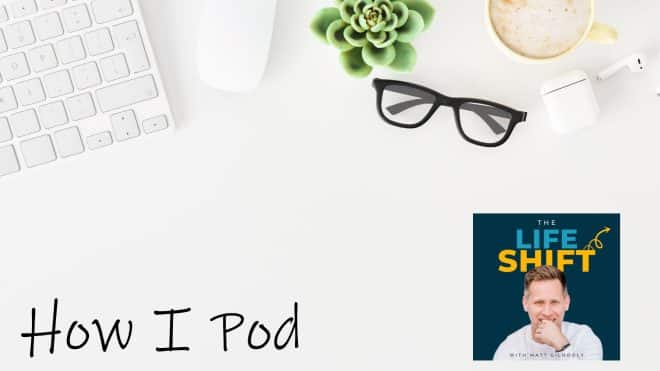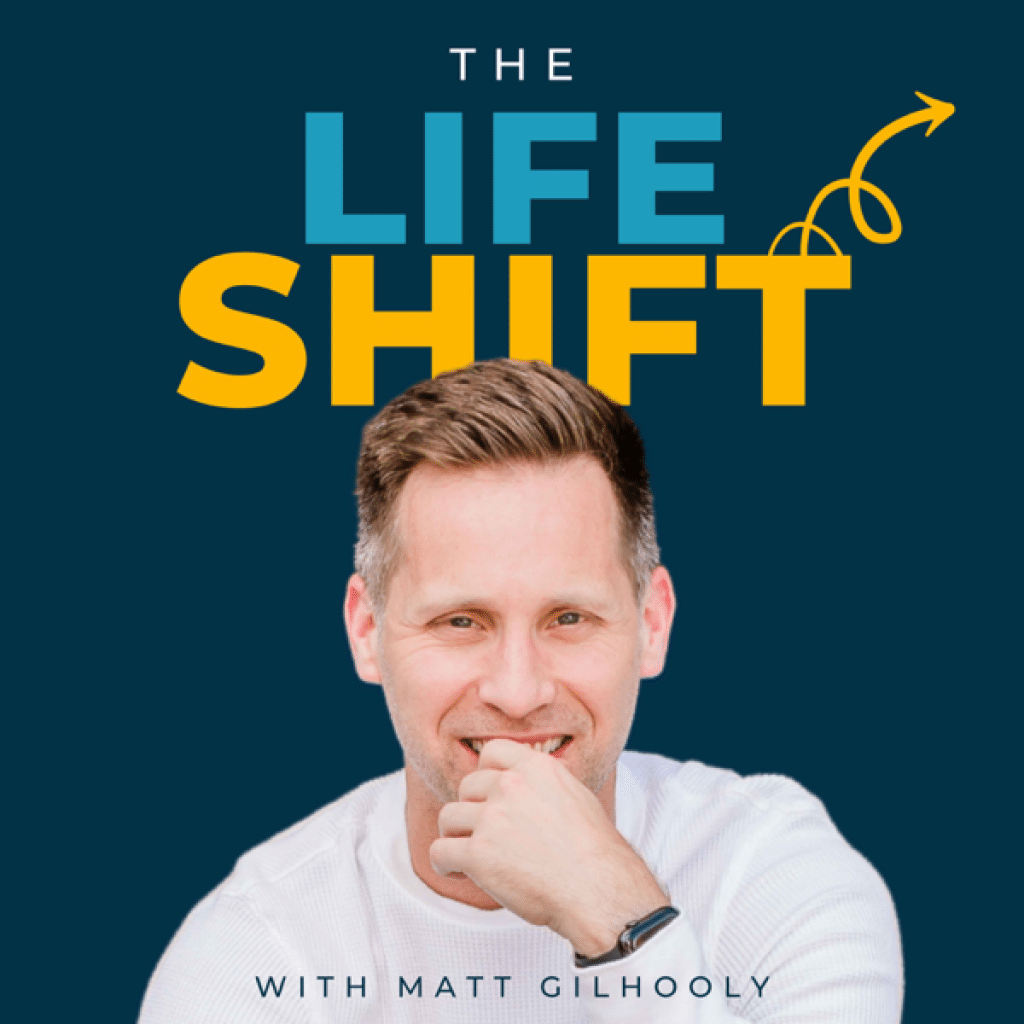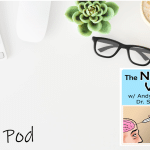Turning Point: Why The Life Shift Podcast Empowers Genuine Change

Last updated on November 12th, 2023
Plans rarely play out the way we expect them to.
Life is all about change. Constant change. So we are defined less by what we plan, rather, we are defined by how we handle the turning point. The point where our plans are no longer viable or possible. Where we realize we may be on the wrong tack and need to change course.
Or when some major event or life changing factor disrupts our plans and we have to do something different. Something new. Perhaps something scary.
That’s what Life Shift with Matt Gilhooly is all about. Exploring who we are when the chips are down and we are at that turning point.
Matt Gilhooly – Turning Point Expert
It took me a long time to write this post. When I stumbled across Life Shift, I was floored by what I heard. I quickly binged the show and found the discussions engaging and cathartic. See, I’m currently in the process of my own life shift. I’m experiencing my own turning point moment.
I’m evaluating options and making new plans as what I thought would be the second half of my life, isn’t going to play out the way I intended.
The work that Matt Gilhooly is doing with Life Shift struck a personal chord.
It became difficult to pick out highlights of the show to share with you because each episode was relatable. Each episode, and each discussion, resonated deeper than I thought it would.
In a society that is more fragmented and divided than I can remember in my adult life, Matt is producing a show that seems uniquely universal. I tried listening to the episodes in the background as I was doing something else, but I kept finding myself drawn into the discussion and had to stop and pay close attention. I had to see how everyone dealt with their own turning point.
And that’s credit to host Matt Gilhooly for facilitating a discussion that draws out vulnerability that is innate in all of us. But it’s a vulnerability we’re taught not to show.
Life Shift Format
The format of Life Shift takes the form of an interview. Well, a discussion. There are no scripted questions and Matt does more listening than questioning. Letting the conversation unfold in an organic fashion. In that discussion he really wants to find the exact turning point that sent the guest’s life in a new direction.
As Socrates said, “the unexamined life is not worth living,” and the introspective nature of Matt’s interviews is nothing short of captivating.
Matt mentioned that he doesn’t really have any direct interviewer influences, but as a rabid listener, I can make a couple of comparisons I think are apt.
If you ever watched Craig Furgeson do an interview on the Late Late Show, where he tears up the questions from the outset, you have a good idea of the format of Life Shift. Sean Evans of Hot Ones is another close comparison in technique.
That said, you have to listen to the show to appreciate the intimacy of the free flowing discussion. Matt’s active listening ability is off the charts. If you are looking to create a podcast of your own (and you should), then you should take a page from Matt Gilhooly’s interviewing techniques.
It’s a discussion without an agenda. The authenticity of Matt’s curiosity and interest in his guests is palpable and comes right through the speakers, headphones, or whatever listening device you happen to be using.
I’ve peppered a few of my favorite episodes throughout this post, but really, you can pull a life lesson from every episode. The work is fantastic and speaks for itself.
That said, Matt was kind enough to answer some questions for the “How I Pod” series, so let’s get to it.
Matt Gilhooly Interview
I sent Matt a series of questions via email that he answered. I have edited very little of the responses, and that was really only a formatting issue. And yes, I see the irony in using prepared static questions when the interviewee is so adept at pivoting with a fluid conversation.
But those are the breaks with email. Fascinating answers though. So read on.
James Griffin (JG): I’d love to hear more about the genesis of the podcast. A lot of it has come out over various episodes as you connect with your guests, but you found a universal pain point and decided to explore it in this medium. Why is that? I know you initial inflection point started with your relationship with your Mom and her passing. Can you expand on that a bit?
Matt Gilhooly (MG): The true start of the podcast was from an assignment in an elective that I took in my second graduate program (2020-2022) at the University of Florida.
The course was called “The Art of Podcasting,” In the course, we needed to create two interview-style episodes after some research. By the time the course was over, I had recorded nearly ten episodes and officially launched the show.
However, as I dove into it more, I wanted to dive into the stories of others sharing a specific moment in time (pivotal moment) that changed their lives and reflect on how that moment changed things.
It stemmed from losing my mother in a motorcycle accident when I was eight and how alone I felt in the experience and the grief journey.
Part of me thinks I created this show for the 8-year-old that still lives inside me. I hope that the stories help others feel less alone in their circumstances.
JG: What do you think the most important part or skill is in interviewing? Your discussions remind me of a more intimate “Hot One’s” style. Who do you think are some of the best interviewers that you may draw inspiration from? Do you even draw inspiration, or is this just something you have an aptitude for?
MG: I do not know that I intentionally draw inspiration from any interviewers. I recorded the first two episodes with a list of questions. And I found it so foreign that it did not serve the show (or me) well. So I threw them away and focused on honing my active listening skills.
I approach each conversation with genuine curiosity. I want the episodes to feel like a conversation I wish most humans would be brave enough to have with each other.
I think this also helps my guests feel comfortable and safe when sharing their stories.
JG: What drew you to the podcast medium? Did you think that would be easier to start up than a YouTube channel? Is video podcasting or a YouTube channel on the horizon? Or are you an audio purist?
Scott Galloway of the Prof G podcast has said several times that podcasting, purely audio, is the most intimate medium for these discussions and when someone comes up to him he can tell right away by the approach if it came from a TV appearance, a book, or the podcast.
Would you agree that audio holds a certain intimacy that is hard to duplicate?
MG: I am undoubtedly audio-first. I spend significantly more time editing the audio version of the podcast. However, around episode 22, I began editing the video versions of the podcast. Truthfully, my presence on YouTube is primarily because “some podcast guru” told me I should be there.
I understand the need for discoverability – in fact, a few people regularly choose the video over the audio (despite less editing for filler words, etc.).
That being said, since the audio version is typically directly in the ears with headphones, I want it to sound the best it can with my limited audio engineering knowledge. In addition, I don’t want distractions or something that might make the audience miss out on important stories from my guests.
JG: What is your technical setup for podcasting? What mic are you using, what software primarily, are you editing the audio yourself right now? Your twitter posts seem to indicate it’s a one man show right now, but do you have grander plans for the future? If you’re not a one man show, who should we be highlighting?
MG: I do it all. Sometimes it can be exhausting, but because my WHY is so strong, it all is doable and worth every moment. I have my home office set up to record the audio and video. I use a Shure mic on a boom arm and a MacBook Air webcam for video (for now, until Patreon grows). I use Riverside for the double-ender recordings (since the first episode).
I edit my audio in Logic Pro X and the video in DaVinci Resolve. My social media assets are a combo of Canva, Momento (AI tool), and Riverside video clips.
JG: Where are you sourcing guests for the show? They’ve all hit hard. These discussions are universally relatable, but also so different. How do you keep the thread? Because not one of these episodes has been phoned in.
MG: At first, I started with people I knew. Eventually, I ran out of friends that wanted to share their stories. So I started networking more on social media and got more connections to share their stories. At this point, over a year into the journey, I have not sought a guest in a while.
I regularly get pitched now, which is excellent, but it also has some complications.
The pitches are tricky, because I want to ensure that the guest has thought about the SPECIFIC turning point moment that changed their lives.
Some people think they are ready to tell their stories, but if they have not dissected the moment for themselves, it can be hard to have a story that works on The Life Shift podcast.
I say it is hard because I am dealing with people’s personal stories. It is hard to tell someone that perhaps their life story is “not enough” when it’s just not fleshed out enough for the show’s concept/theme yet.
I try to balance internal shifts with external shifts as I release episodes. I want to make sure I am not overwhelming the audience with trauma after trauma, but since that is my experience (with my mother), I naturally gravitate (and connect with) these turning point moments a bit more.
JG: Do you think experiencing these existential inflection points is necessary for growth? It seems like mainstream success is framed in this “Instagram Life” coasting. Where the road to success or happiness is just a 45 degree straight line up on the graph over time.
Do you think that’s healthy? Is that part of why you started the podcast?
MG: Gosh. This is a tough question. I think I am biased. My traumas, my failed grief journey, my closure, my successful grief journey with my grandmother, all of those moments made me this person today.
I would not change a thing. Each moment happened as I needed and taught me something about myself. It taught me sympathy and empathy.
In general, I wouldn’t wish challenging moments (or existential inflection points) on anyone.
Still, I have found that many of my most impactful guests have had these moments and created a more enhanced version of the person they once were. So, I guess, in short, I think these moments help get us closer to who we CAN be, but only if we analyze and process them appropriately for us, which is a different process for everyone.
JG: Is there an episode you are particularly proud of or one that hit especially close to home for you?
MG: This is Sophie’s Choice here. I’m not sure I can pick one episode that I’m most proud of. In my mind, this show is so much more about my guests than me. They are the stars.
However, there is an episode coming on April 25, 2023, where it was the first time I achieved (for myself) what I wanted the show to do for others. My guest’s story helped validate my experiences and made me feel “less alone” in my journey.
So, selfishly, that episode showed me that my goals for this show are possible. I want at least one person per episode to feel less alone.
JG: Conversely, nobody is perfect, is there an episode that you think you could have done a better job on? If so, what was lacking or not up to standard for you? What would you go back and change?
MG: I certainly feel there are episodes where I have “Failed” in my mission. Typically, this is my fault for not vetting my guests enough or asking them if they have dissected the moment enough.
However, this is tricky because I want to always have candid conversations with my guests. Which means I don’t want to know “too much” about their journey. I want it to unfold as a conversation would.
So, I guess I might do a better job with the intake for some episodes, making sure the guest was ready.
However, I’ve also found that those “failed” episodes found the ears that needed to hear the story. So, I guess that’s still a win. I’ve tried to get better at letting this “failure” feeling go.
You never know how someone’s story might affect someone else.
JG: What’s the feedback (other than mine) been like? Do you feel like the show is resonating? I like that you’re posting your growth milestones. Do you feel like your listeners are on this journey with you?
MG: I’ve had over 100 ratings on Apple Podcast, with mostly great feedback about the importance of creating a space for these stories.
My guests are often super kind in their reactions once they hear the episode (with the public – no early sneak peeks). So I think people are on the journey with me.
It can be hard as an indie podcaster when you want to compare yourself to big shows. So, I must remind myself of my goal – one person feeling less alone per episode. We need to normalize the ups and downs of the human experience.
I think we’re doing this, and I am grateful for my guests and listeners EVERY DAY.
I got a 3-star review once that said, “It’s just okay…” and it hurt slightly. But I turned it into a t-shirt to remind myself that this show is not for everyone and is okay. Also, “okay” is better than “terrible!”
JG: Is there anything I haven’t touched on that you’d like to share? Favorite color? Any advice on pushing through these difficult, often painful, experiences?
MG: I’ve learned that we all must process our experiences in the best way for us. However, if I had to give someone advice, it would be this, “allow yourself to feel however you are feeling at any point in time. All of it is valid and okay. You are a human. Be open to all the emotions as they come and process them as you can.”
I tend to gravitate towards blues and greens. I’m not sure what that says about me.
Go Listen to Life Shift with Matt Gilhooly
Matt is one of the better interviewers in the podcast space. Certainly the indie podcast space. If you aren’t already hooked by the excellent work he’s doing, you will be. It’s work that can be cathartic, can heal, and maybe make us a little more empathetic. Maybe we can give people the benefit of the doubt more often and not assume we know what brought them to the current moment.
Afterall, we’re all carrying some baggage from our own turning point in the past that is going to necessarily influence how we engage the current moment. So, Matt’s work can’t be overlooked. For those looking to create their own podcasts, there are a lot of lessons to be drawn from the work Matt is doing.
And, remember, as an indie podcaster, there are costs associated with producing a show that need to be covered.
Not everyone has a Joe Rogan style deal.
So take a minute to think about signing up for the Life Shift Podcast Patreon. We are big supporters of indie podcasting at Discover Pods and this is one podcast worth supporting.













Comments
Comments are closed.